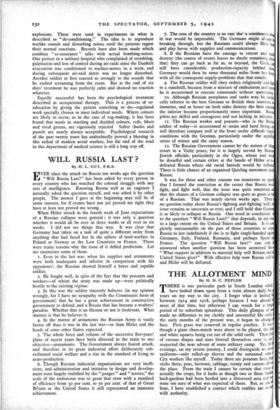WILL RUSSIA LAST ?
By H. L. GUY, F.R.S.
EVER since the attack on Russia ten weeks ago the question " Will Russia Last?" has been asked by every person in every country who has watched the colossal struggle with any sort of intelligence. Knowing Russia well as an engineer I naturally asked the question myself, and was asked it by other people. The answer I gave at the beginning may still be of some interest, for if events have not yet proved me right they have at least not proved me wrong.
When Hitler struck in the fourth week of June expectations of a Russian collapse were general ; it was only a question whether it would all be over in three weeks or all over in six weeks. I did not see things that way. It was clear that Germany had taken on a task of quite a different order from anything that had faced her in the sphere of land-warfare in Poland or Norway or the Low Countries or France. There were many reasons why the issue of it defied prediction. Let me enumerate some of them.
t. Even in the last war, when his supplies and armaments were both inadequate and inferior in comparison with his opponents', the Russian showed himself a brave and capable soldier.
2. He fought well, in spite of the fact that the peasants and workers—of whom the army was made up—were politically hostile to the existing regime.
3. In this war the soldier sincerely believes (in my opinion wrongly, for I have no sympathy with the Communist form of government) that he has a great achievement in constructive government to defend, and a Russia that has become a workers' paradise. Whether that is an illusion or not is irrelevant. What matters is that he believes it.
4. In the matter of armaments the Russian Army is vastly better off than it was in the last war—or than Hitler and the heads of some other States expected.
5. The whole force and volume of the successive five-years' plans of recent years have been directed in the main to one objective—armaments. The Government always feared attack, and therefore in its great industrial effort deliberately sub- ordinated social welfare and a rise in the standard of living to arms-production.
6. Though Russian industrial organisations are very ineffi- cient, and administration and initiative in design and develop- ment were largely stultified by the " purges " and " terrors," the scale of the endeavour was so great that even with a standard of efficiency from 3o per cent. to 5o per cent. of that of Great Britain or the United States it still represented an immense achievement. 7. The area of the country as so vast the a continuous in war would be impossible. The Germans might always breaking through, but the Russians could always filter bad and play havoc with supplies and communications.
8. If the Russians have the courage to retreat and reap destroy (the course of events leaves no doubt remaining a that) they can go back as far as, or beyond, the Urals, still have considerable production-capacity behind tb Germany would then be some thousand miles from her ba with all the consequent supply-problems that that entails.
9. The Russian soldier will obey orders religiously and to a standstill, because from a mixture of enthusiasm and t he is accustomed to execute commands without questioning.
to. Although Russian aeroplanes and tanks may be tec tally inferior to the best German or British their numbers immense, and as losses on both sides destroy the best mat the inferior become proportionately more important. Russ' pilots are skilful and courageous and not lacking in initiative.
r. The Russian worker and peasant—who is the Rus soldier of today—is accustomed to strain and hard living, will therefore compare well at the front under difficult suppi conditions with the German, particularly under the app stress of winter and the rainy season.
12. The Russian Government cannot by the nature of resort to a Vichy peace, for it is largely served by Russ Jewish officials, particularly in the .0gpu, whose end w be dreadful and certain either at the hands of Hitler or in defeated Russia where old racial hatreds would be infla There is little chance of an organised Quisling movement in Russia.
It was for these and other reasons too numerous to op that I formed the conviction at the outset that Russia w fight, and fight well, that the issue was quite uncertain that the chance of a German collapse was quite as great as of a Russian. That was nearly eleven weeks ago. There no question today about Russia's fighting and fighting well; issue remains as uncertain as ever, and I still hold that Gera is as likely to collapse as Russia. One word in conclusion. to the question "Will Russia Last?" that depends, in my r to a large extent on the United States and Britain. It is co pletely unreasonable on the part of those countries to ex Russia to last indefinitely if she is to fight single-handed ag Germany, Italy, Finland, Rumania, and perhaps Spain France. The question " Will Russia last?" can only answered when another question has been answered first " What support in addition to material help will Britain and United States give?" With effective help now Russia will and Hitler will be defeated.


























 Previous page
Previous page